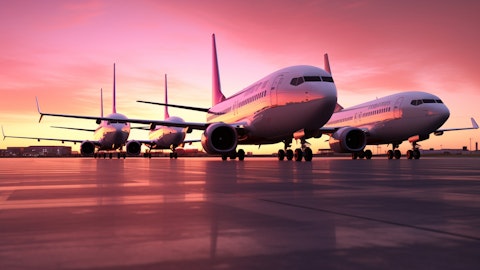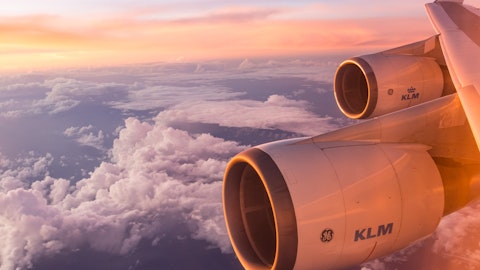Like that’s nothing to do with Boeing. I mean that’s a maintenance issue within Air Canada but it’s all a pilot on 737. There are two large volume aircraft, the A320 family and the 737 family, they carry 90% of the world’s passengers on a daily basis. They are terrific aircraft. They are very safe. We are big supporters of the 737 and particularly the new variant, the Gamechanger, which is carrying 4% more passengers and burning 16% less fuel and especially the MAX 10, which will carry 20% more passengers and burn 20% less fuel. As Neil said, we expect the Gamechanger the MAX 10s to be certified, Boeing I believe in the Q4 of 2024 first delivery to the American Airlines in early 2025. We’re not pleased to get the first MAX 10 in 2027.
So we are well down the list of deliveries, but we can’t wait to take them and pass on the value or the incredible value that those are – the cost reductions of those air – cost efficiencies, those aircraft will deliver for us. We then pass it on in the form of lower fares to customers. Thanks, Jamie. Next question, please.
Operator: The next question comes from Sathish Sivakumar from Citi. Please go ahead, your line is open.
Michael O’Leary: Sathish, hi.
Sathish Sivakumar: Hi, Michael. Yes, thank you. I’ve got two questions here. So firstly, on the capital allocation. Obviously, you have started the interim dividend today. And what does it mean in terms of share buyback and balance given the balance sheet strength as we go into full year results or into 2025? So that’s my first one. And then the second one, obviously, you flagged the about deep pilots being in terms of labor as such, is being under pressure in the UK. But are you seeing anywhere else in Continental Europe where the pilots are actually under pressure like in terms of availability is being under pressure? Yes. Thank you.
Michael O’Leary: Thanks, Satish. So quick ones on capital allocation, we will continue to pay down debt. We’ll continue to fund all of our CapEx from internally generated cash flow. However, CapEx falls steeply in the next 2 years from almost €3 billion down to just under €1 billion a year. That should – if profitability maintains where it is spring out throw off about €2 billion a year in free cash for the next 2 years. Quarter of that will be allocated to dividend payments and then I think the Board, subject to all being well with the balance sheet and the rest of the world will be looking to return the additional any spare cash to shareholders. It will be – and it will be a case-by-case basis. There will be special dividends or buybacks.
And I think that the driver of that will be generally p multiples whenever we come to do it, but we won’t promise. We’re not going to borrow to do it once we generate the cash. If we have more than €3.5 billion, €3 billion, €4 billion in cash on the balance sheet, then anything surplus to that will be returned. We have two big more – two more big debt payments, but one is in ‘25 – one is in FY ‘26 and the other is in FY ‘27. So I think shareholders should support should expect more returns, but what format they would be. We don’t know if that will be amount of the Board. Pilots, we’re not seeing huge pressure on pilots across Europe. There is some pressure in the UK. There was – some of the other UK airlines were kind of paying out panic pay increases last year because they came out of COVID short of pilot.
That does seem to settle down. We are not seeing significant pilot attrition, but I think we did have a gap between our pilot pay and that competitor for the last year, again, as a result of these kind of panic pay increases that some other particularly 737 airlines in Europe and in the UK, were paying. We intend and plan to keep our pilot pay competitive. We will never be the best payer, but we certainly will keep it competitive and the rapidity of Ryanair’s growth and the rate of promotion like you’ll go from being a cadet here to caption on the 737 typically within a period of 4 or 5 years if you’re up to the job. And that is what drives very rapid increase in pilot pay. UK, we think we’re okay at this point in time. The market is tight because of the inflexibility of UK labor post Brexit and we don’t have – we have some growth in the UK, but not a lot.
But we believe that the pay deals we’ve now agreed with the unions, pilot unions, and we’re extending out the camera units as well, leaves us well positioned with ample pilot and cabin crew resources for summer 2024 but that’s heavily dependent upon there are not being another meltdown in European ATC. And the things like a repeat of the 60 days of ATC strikes, which we suffered in summer 2023 they really do eat up an awful lot of crew hours at peak period. And it’s something that we’re building in slightly higher crewing ratios to improve our resilience and that, in turn, reduces some of the productivity elements of pilot pay. Ed, if wants to comment on that point.



